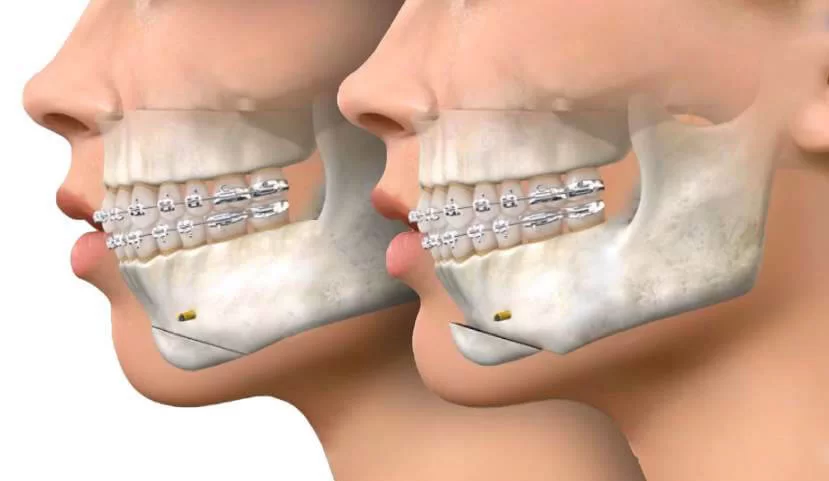Have a Question?
Contact Us Now
Contact Us Now
What is Orthognathic Surgery?
Orthognathic Surgery is the surgical procedure performed to bring the jaw and teeth into the position they should be in when the lower and upper jaws are not positioned normally or the teeth do not fit together when the mouth is closed.
Before starting the treatment, the patient's head radiographs (panoramic, cephalometric, three-dimensional radiographs, etc.) are taken and examined. Then, a detailed consultation (by a jaw surgeon, orthodontist, and dentist) is performed. Before the treatment, the patient must share all the questions they have about their treatment with their physician. The patient, who is informed in detail about the treatment, follows the treatment plan with their physician (jaw surgeon, orthodontist, and dentist).
Who Can Have Orthognathic Surgery?
It is recommended for people whose teeth and jaws do not close properly, who have inadequate chewing and speech functions, and whose facial aesthetics are impaired.
How is the Pre-Jaw Surgery Examination Performed?
First, a detailed orthodontic evaluation is performed in the mouth. Depending on many reasons, bite problems, shape and aesthetic disorders can be seen in the lower jaw.
If the patient's joint and bite complaints are very severe, it can sometimes make life very difficult. However, it is possible to correct them with jaw surgery at any age.
After orthodontic treatment, jaw surgery is planned after a good teeth alignment is achieved.
At What Age Is Jaw Surgery (Orthognathic Surgery) Performed?
Since bone development can be affected in bone surgeries performed at an early age, jaw surgeries are generally performed after the age of 18.
In cases where it is not expected due to extreme developmental delay; surgery can be performed at a younger age in order to lengthen the bones.
In addition, jaw surgery can be performed for those under the age of 18 in cases where intervention is required in the jaw joint.
How Many Hours Does Jaw Surgery Take?
The surgery for each jaw takes approximately 2 hours on average.
Is There a Risk in Jaw Surgery?
Apart from facial swelling, nausea, vomiting, and small blood leaks that can be seen in every surgery, the complication that can be seen is a decrease or loss of sensation in the lower lips. Complete loss of sensation is very rare.
In jaw surgery; there is no risk of death (unless the patient has an unknown special risk).
Recovery Process After Jaw Surgery
In patients who undergo Jaw Surgery; painkillers, antibiotics and treatments to reduce facial swelling are applied after the surgery. In addition, supportive treatment is given with serums.
A situation that requires the patient to stay in intensive care is very rare. Nutrition is started with liquid foods on the same day.
After the patient's general condition improves and this process usually occurs 2-4 days after jaw surgery. The lower and upper jaw teeth are fixed to each other with rubber bands and the mouth is closed for 1-3 weeks. This bone makes healing safer.
Before starting the treatment, the patient's head radiographs (panoramic, cephalometric, three-dimensional radiographs, etc.) are taken and examined. Then, a detailed consultation (by a jaw surgeon, orthodontist, and dentist) is performed. Before the treatment, the patient must share all the questions they have about their treatment with their physician. The patient, who is informed in detail about the treatment, follows the treatment plan with their physician (jaw surgeon, orthodontist, and dentist).
Who Can Have Orthognathic Surgery?
It is recommended for people whose teeth and jaws do not close properly, who have inadequate chewing and speech functions, and whose facial aesthetics are impaired.
How is the Pre-Jaw Surgery Examination Performed?
First, a detailed orthodontic evaluation is performed in the mouth. Depending on many reasons, bite problems, shape and aesthetic disorders can be seen in the lower jaw.
If the patient's joint and bite complaints are very severe, it can sometimes make life very difficult. However, it is possible to correct them with jaw surgery at any age.
After orthodontic treatment, jaw surgery is planned after a good teeth alignment is achieved.
At What Age Is Jaw Surgery (Orthognathic Surgery) Performed?
Since bone development can be affected in bone surgeries performed at an early age, jaw surgeries are generally performed after the age of 18.
In cases where it is not expected due to extreme developmental delay; surgery can be performed at a younger age in order to lengthen the bones.
In addition, jaw surgery can be performed for those under the age of 18 in cases where intervention is required in the jaw joint.
How Many Hours Does Jaw Surgery Take?
The surgery for each jaw takes approximately 2 hours on average.
Is There a Risk in Jaw Surgery?
Apart from facial swelling, nausea, vomiting, and small blood leaks that can be seen in every surgery, the complication that can be seen is a decrease or loss of sensation in the lower lips. Complete loss of sensation is very rare.
In jaw surgery; there is no risk of death (unless the patient has an unknown special risk).
Recovery Process After Jaw Surgery
In patients who undergo Jaw Surgery; painkillers, antibiotics and treatments to reduce facial swelling are applied after the surgery. In addition, supportive treatment is given with serums.
A situation that requires the patient to stay in intensive care is very rare. Nutrition is started with liquid foods on the same day.
After the patient's general condition improves and this process usually occurs 2-4 days after jaw surgery. The lower and upper jaw teeth are fixed to each other with rubber bands and the mouth is closed for 1-3 weeks. This bone makes healing safer.




